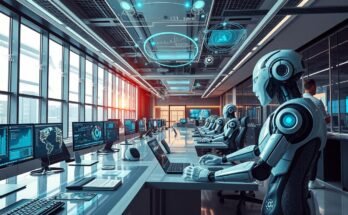Introduction
As we look ahead, AI technology is changing our world fast. This article explores how AI will shape the next decade. We’ll see big leaps in machine learning, neural networks, and natural language processing. Autonomous systems and robotics will also rise.
Get ready to be amazed by the future. We’ll see how AI will change our lives in healthcare, biotechnology, and business. It’s going to be exciting.

Key Takeaways
- Transformative advancements in AI technology are on the horizon for the next decade.
- Breakthroughs in machine learning and neural networks will unlock new frontiers.
- The integration of quantum computing will revolutionize AI capabilities.
- Natural language processing will undergo a profound transformation.
- Autonomous systems and robotics will become more prevalent in our daily lives.
- AI will drive groundbreaking innovations in healthcare and biotechnology.
- Ethical considerations and regulatory frameworks will shape the responsible development of AI.
The Current State of AI Technology and Its Evolution
Artificial intelligence (AI) is changing the world of technology. It’s making big steps in innovation. We see amazing machine learning breakthroughs and neural network innovations that show what’s possible.
Key Milestones in AI Development
The journey of AI has seen key moments. The Turing test in the 1950s to today’s advances in natural language and computer vision. These moments have pushed AI forward and opened up new possibilities.
Foundation Models and Their Impact
Foundation models like GPT-3 and DALL-E have changed AI. They can create text, images, and code like humans. These models have opened new areas in natural language, content creation, and problem-solving.
Present-Day AI Applications
AI is now used in many ways. It helps with shopping suggestions and real-time translation. It’s also changing healthcare, finance, and transportation. AI is solving big problems and making life better.
“AI is not a magic bullet, but it can be a powerful tool in our arsenal to tackle some of the world’s most pressing challenges.”
Looking ahead, AI’s future is bright. With ongoing machine learning breakthroughs and neural network innovations, AI’s impact will only grow.
AI Technology Predictions for the Next Decade
The world of artificial intelligence (AI) is changing fast. The next decade will bring even more exciting changes. Experts say AI will change how we work, live, and interact with the world.
Experts predict a big role for foundation models in the next ten years. These large AI models can help with many tasks, like understanding language and seeing images. They will help create content, solve problems, and assist us in many ways.
Quantum computing will also play a big part. Quantum computers can solve problems in new ways. This could lead to big advances in AI, making it faster and more powerful.
The next decade will also see more self-learning systems. These AI models can learn and adapt on their own. They will make AI applications like self-driving cars and personalized healthcare better and more efficient.
The future of AI looks very promising. With foundation models, quantum computing, and self-learning systems, the next ten years will be exciting. AI will change our lives in many ways.

“The future of artificial intelligence is not about creating sentient machines, but about augmenting and empowering human intelligence to tackle the world’s most pressing challenges.”
Breakthroughs in Machine Learning and Neural Networks
The world of artificial intelligence is on the verge of a big change. This change comes from fast progress in machine learning and neural networks. Experts say we will see huge leaps in the next decade that will change what’s possible.
Advanced Deep Learning Architectures
Deep learning is getting more exciting in AI. Scientists are making new neural network designs. These designs can solve complex problems better and faster.
For example, some networks are great at seeing things, while others are good at understanding language. The variety of these designs is growing fast.
Quantum Computing Integration
Another big area is combining quantum computing with machine learning. Quantum algorithms could make neural networks much faster. This could unlock new levels of power in computing.
As quantum computing gets better, we’ll see these two fields come together. This will lead to machine learning breakthroughs we can’t even imagine yet.
Self-Learning Systems
AI researchers are also working on self-learning systems. These systems can learn and get better on their own. They will change how we solve problems.
The neural network innovations behind these systems will let them learn and grow in real-time. This will lead to truly smart and independent agents.
The next decade will be a big time for AI. We’ll see new architectures, quantum integration, and self-learning systems. The future of AI is set to change the world in amazing ways.

Natural Language Processing Revolution
The next decade will see a big change in natural language processing (NLP). New NLP technologies will change how we talk to machines. They will help us communicate better and understand each other more easily.
At the heart of this change are natural language processing developments. These advancements are making machines smarter at understanding and using language. Soon, we’ll see chatbots that talk like humans and language models that get complex ideas.
Advancements in Language Understanding
New deep learning models and transformer-based systems are making machines smarter. They can now understand complex language and know what we really mean. This is a big step towards better language processing.
Intelligent Language Generation and Translation
These new models are also improving language generation and translation. They can write like humans, making chatbots and content creators better. This means we’ll see more natural language in technology.
Implications for Human-AI Interaction
The changes in natural language processing developments will change how we talk to AI. Machines will understand us better, making our interactions with technology smoother. This will lead to more efficient and personalized interactions.
Imagine virtual assistants that know what you need before you ask. Or language interfaces that make complex tasks easy. The future of natural language processing developments is exciting and will change how we use technology.

The Rise of Autonomous Systems and Robotics
Autonomous systems and robotics are evolving fast, changing many industries. We see big steps in self-driving cars and smarter factory robots. These changes will greatly impact our world in the next ten years.
Self-Driving Vehicle Advancements
The move towards self-driving cars is speeding up. Big names in tech and cars are working hard to make these cars a reality. They’re using new sensors, AI, and car-to-everything tech to make driving safer and easier.
These cars could cut down on accidents and make traffic better. They also help people who can’t drive easily.
Industrial Automation Evolution
Robotics and automation are changing factories and warehouses. Advanced robots can do complex tasks quickly and accurately. They work with smart systems and learn from data to boost productivity and quality.
This new era of efficiency is making businesses more competitive. It’s all thanks to the growth of autonomous systems evolution in industry.
Human-Robot Collaboration
Robotics and automation are moving towards better teamwork with humans. Cobots are robots that work with people, making tasks easier and safer. This teamwork increases productivity and opens up new job opportunities.
| Autonomous Systems Evolution | Robotics and Automation Progress |
|---|---|
| Self-driving vehicles | Industrial robot adoption |
| Advanced sensor technology | Cobots for human-robot collaboration |
| AI-powered decision making | Increased productivity and efficiency |
“The integration of autonomous systems and robotics is revolutionizing the way we live and work, ushering in a new era of efficiency, safety, and human-machine collaboration.”
AI in Healthcare and Biotechnology
The future of healthcare and biotechnology is bright with AI. It will change how we diagnose, treat, and find new drugs. The next decade will see big changes in these fields.
AI will make medical diagnostics better. It will look at lots of patient data to find diseases fast and accurately. Doctors will make better choices, helping patients get better sooner.
AI will also make personalized medicine better. It will use machine learning to create treatments just for you. This will make treatments work better and be safer.
AI will speed up finding new drugs. It will look through lots of chemicals to find good ones. This means we’ll get new drugs faster and find treatments for rare diseases.
Genetic research will also get a boost from AI. It will help us understand genetic diseases better. This could lead to better treatments and ways to prevent these diseases.
AI will change healthcare and biotechnology a lot in the next decade. It will make care better and help us find new ways to stay healthy. These changes will open up new possibilities in medicine and science.

“The future of healthcare is AI-driven, personalized, and empowered by data-driven insights.”
Ethical Considerations and Regulatory Framework
AI technology is growing fast, and we need to think about its ethics and rules. It’s important to make sure AI is used responsibly. This helps avoid risks and makes sure AI has a positive effect on society and the economy.
Privacy and Data Protection
AI uses a lot of data, which raises privacy concerns. We need strong rules to protect our personal info. These rules should stop data misuse and make sure we know how our info is used.
AI Governance Standards
We need clear rules for AI to build trust. These rules should cover things like bias in algorithms and how AI systems match human values. This ensures AI is fair and ethical.
Responsible AI Development
Creating AI responsibly means putting people and society first. We should promote ethical AI, work together across fields, and partner with both public and private sectors. This helps make AI a force for good.
FAQ
What are some of the key milestones in AI development?
Key milestones in AI include the start of machine learning, the rise of deep learning, and the growth of natural language processing. We’ve also seen big steps in computer vision and robotics.
How are foundation models impacting the AI landscape?
Foundation models, like large language models, are changing AI. They offer a base that can be used for many tasks. These models are great at understanding and generating language.
What are some of the current AI applications being used today?
AI is used in many fields today. In healthcare, it helps with diagnosis and finding new drugs. In finance, it spots fraud and manages investments. It also helps in e-commerce, smart homes, and cars.
What advancements in deep learning architectures are expected in the next decade?
Next decade, we’ll see new deep learning models. These include transformers and few-shot learning. They will improve how AI understands language and sees the world.
How will quantum computing integration impact AI?
Quantum computing will change AI a lot. It will help with solving complex problems and improving algorithms. This could lead to big breakthroughs in AI.
What advancements are expected in self-learning systems?
Self-learning systems will get smarter. They will learn and improve on their own. This will make them more independent and able to solve tough problems.
How will natural language processing transform human-AI interaction?
Natural language processing will change how we talk to AI. It will make interactions more natural and intuitive. AI will understand and respond to us better.
What are the expected advancements in self-driving vehicle technology?
Self-driving cars will get better. We’ll see improvements in sensors, object detection, and decision-making. This will make them safer and more reliable.
How will AI transform the healthcare and biotechnology sectors?
AI will change healthcare and biotech a lot. It will help with diagnosis, treatment, drug discovery, and genetic research. This will lead to better healthcare and medical breakthroughs.
What ethical considerations and regulatory frameworks are being developed for AI?
As AI grows, we need to think about ethics and rules. We’re working on privacy, data protection, and AI standards. This ensures AI is used for good.



